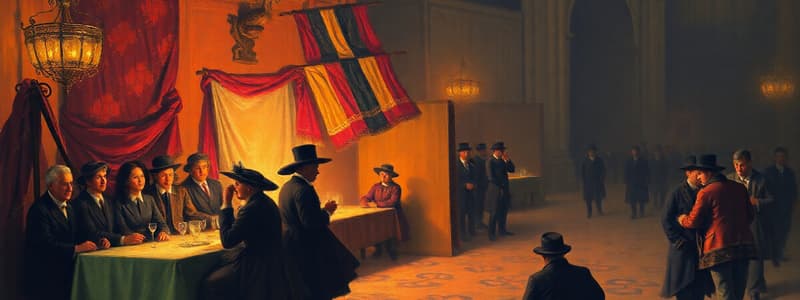Podcast
Questions and Answers
How was the French political structure organized before the revolution in terms of power distribution?
How was the French political structure organized before the revolution in terms of power distribution?
The French political system was hierarchical, with absolute power held by the monarch. The nobility and clergy had substantial privileges and were exempt from many taxes.
What was a key economic inefficiency in pre-revolutionary France?
What was a key economic inefficiency in pre-revolutionary France?
The inconsistent tax policies and rigid social structure were key inefficiencies in the economic system of pre-revolutionary France.
How did the social structure of pre-revolutionary France contribute to resentment?
How did the social structure of pre-revolutionary France contribute to resentment?
The rigid social hierarchy divided the population into clergy, nobility, and commoners, which caused widespread inequality and resentment.
What did the concept of the 'Divine Right of Kings' assert?
What did the concept of the 'Divine Right of Kings' assert?
Describe the French taxation system before the revolution and who bore the burden of taxation?
Describe the French taxation system before the revolution and who bore the burden of taxation?
What is meant by France being a 'prison' and a 'museum' in the lead-up to the revolution?
What is meant by France being a 'prison' and a 'museum' in the lead-up to the revolution?
What did the fall of the Bastille symbolize?
What did the fall of the Bastille symbolize?
Besides the peasantry, what other groups comprised the commoners in the French social structure?
Besides the peasantry, what other groups comprised the commoners in the French social structure?
Flashcards
Political Structure in Pre-Revolution France
Political Structure in Pre-Revolution France
A hierarchical system with absolute monarchy, nobility, and clergy enjoying privileges.
Economic Inefficiencies
Economic Inefficiencies
Flaws in the economic system including inconsistent tax policies and rigid social structures.
Fall of the Bastille
Fall of the Bastille
The storming of a royal fortress symbolizing resistance against the monarchy.
Social Hierarchy
Social Hierarchy
Signup and view all the flashcards
Divine Right of Kings
Divine Right of Kings
Signup and view all the flashcards
Inequitable Taxation
Inequitable Taxation
Signup and view all the flashcards
Social Inequality
Social Inequality
Signup and view all the flashcards
Crisis in France
Crisis in France
Signup and view all the flashcards
Study Notes
France Before the Revolution: A Political and Economic Overview
- France, plagued by political and economic issues, became a "prison" of its outdated system and a "museum" of failed economic policies in the lead-up to the revolution.
- The political structure was hierarchical, with the monarch holding absolute power. The nobility and clergy enjoyed vast privileges and exemptions from taxation.
- The economic system suffered from various inefficiencies, including inconsistent tax policies and a rigid social structure.
- The prevailing economic order favored the aristocracy and clergy, enriching them while the peasantry and the burgeoning middle class bore a disproportionate tax burden.
The Fall of the Bastille
- The fall of the Bastille, a royal fortress in Paris, became a potent symbol of the revolution.
- It signified the growing resentment of the people towards the monarchy, the escalating crisis in France, and served as a crucial turning point in the revolution.
The Pre-Revolutionary Social Structure in France
- French society epitomised stark divisions.
- A rigid social hierarchy divided the population into the clergy, nobility, and the commoners (including the bourgeoisie, artisans, peasants, and the urban poor), which led to widespread inequality.
- The clergy and nobility enjoyed numerous privileges, including exemptions from taxation.
- The vast majority of the population, the commoners, bore the brunt of taxation while lacking political rights.
- This extreme inequality fueled resentment and contributed to the revolution.
The Divine Right of Kings: Concept
- The idea of the divine right of kings asserted that monarchs derived their authority directly from God.
- This belief legitimized absolute monarchy in France.
- The concept held that the king's power was not subject to or constrained by earthly laws or institutions.
The French Taxation System Before the Revolution
- The taxation system was highly inequitable, favouring the privileged groups (clergy and nobility), placing an enormous burden on the commoners to fund the extravagant lifestyle of the monarchy and its court.
- This system fostered resentment and inequality, contributing significantly to the revolution. The king was a central part of this problem.
Studying That Suits You
Use AI to generate personalized quizzes and flashcards to suit your learning preferences.




